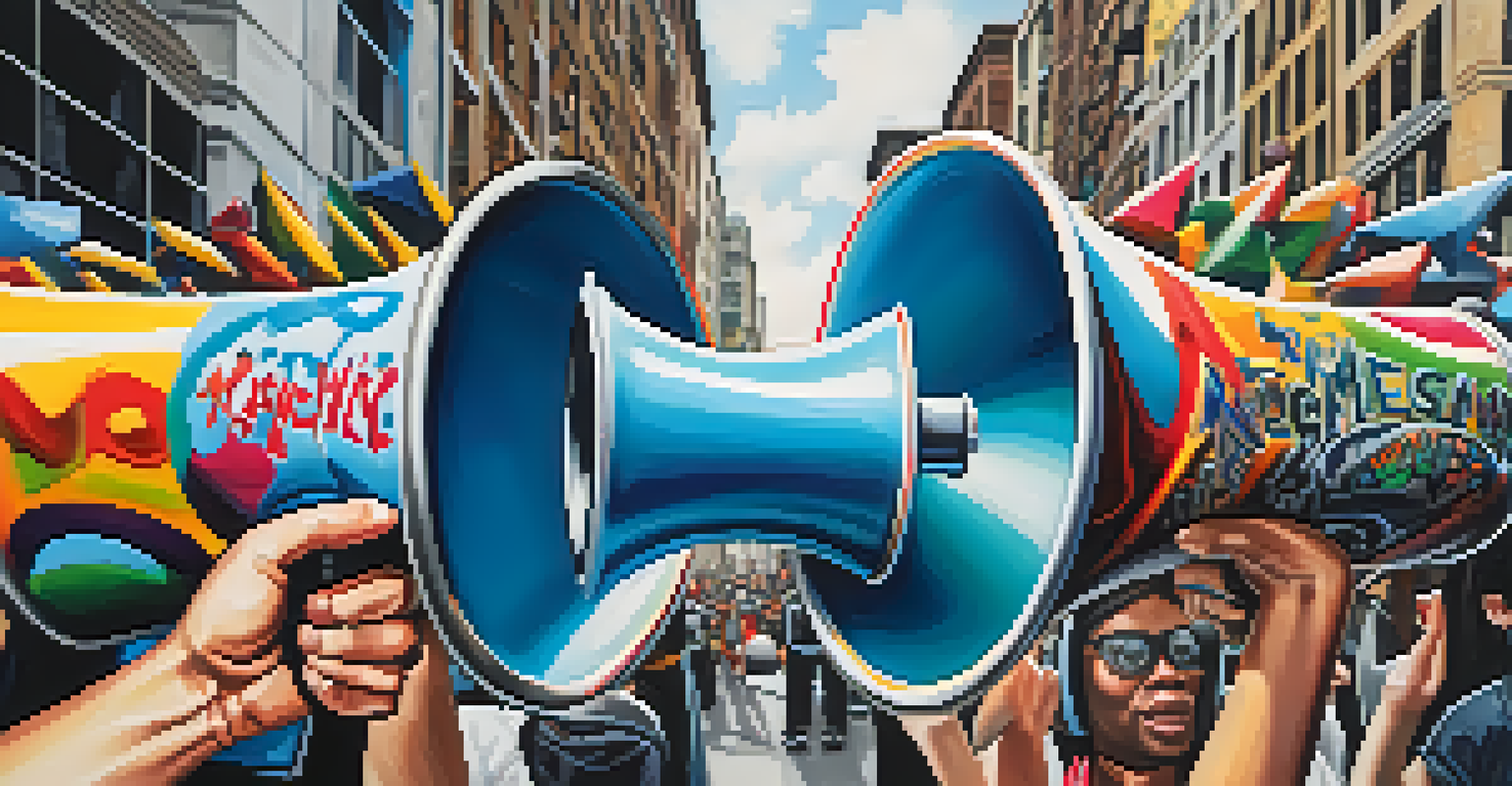Advocacy and Civic Engagement: Making Your Voice Heard

Understanding Advocacy: The Power of Your Voice
Advocacy is all about using your voice to influence change. It can range from simple acts like discussing issues with friends to larger efforts such as organizing community events. Each action contributes to raising awareness and promoting solutions to societal problems. Remember, every voice counts, and your unique perspective can spark meaningful conversations.
The greatest way to make a difference is to be yourself. Be your own advocate.
Think of advocacy as being a lighthouse; it helps guide others through the fog of misinformation and apathy. Just as a lighthouse stands firm against waves, your commitment to speaking up can help illuminate critical issues. Whether it's environmental concerns, social justice, or education reform, advocacy helps shine a light on what matters most to you.
In essence, advocacy empowers individuals and communities alike. By participating in advocacy efforts, you not only express your views but also encourage others to embrace their voices. This collective power can lead to significant change, making your involvement crucial in fostering a vibrant democratic society.
Civic Engagement: More Than Just Voting
When we think of civic engagement, voting often comes to mind first. However, civic engagement encompasses a broader spectrum of activities that connect individuals to their communities. From attending town hall meetings to volunteering for local organizations, every action contributes to the social fabric of your neighborhood. Engaging civically means taking an active role in shaping the world around you.

Imagine civic engagement as a community quilt; each patch represents a different person’s contributions. Just like how each square adds color and texture to the quilt, your participation enhances the community's overall well-being. When we come together to share our skills, knowledge, and time, we create a vibrant tapestry of cooperation and progress.
Advocacy Empowers Change
Using your voice and engaging with others can drive meaningful change in your community.
Moreover, civic engagement builds relationships and trust within communities. It fosters a sense of belonging and responsibility, reminding us that we're all in this together. By engaging with others, we learn from different perspectives, which can lead to innovative solutions and a stronger, more united community.
Identifying Issues: What Matters Most to You?
The first step in advocacy is identifying the issues that resonate with you. Think about the challenges you see in your community or the causes you feel passionate about. You might be concerned about climate change, education, healthcare, or social justice; whatever it is, recognizing your priorities is crucial. Your personal connection to an issue can fuel your motivation to advocate for change.
Activism is my rent for living on the planet.
Consider this process like creating a personal mission statement. Just as a mission statement outlines your goals and values, identifying your issues helps clarify your purpose in advocacy. This clarity allows you to focus your efforts and communicate your message effectively to others.
Additionally, understanding the broader context of these issues can enhance your advocacy efforts. Researching statistics, hearing personal stories, and engaging with local organizations can deepen your understanding. This knowledge not only strengthens your voice but also equips you to inspire others to join your cause.
Building Your Advocacy Skills: Tools for Success
Advocacy is a skill that can be developed with practice and persistence. Start by honing your communication skills, as effective advocacy relies heavily on how well you can express your ideas. Whether it’s writing persuasive letters, speaking at community events, or engaging on social media, clear and compelling communication is key. Consider taking workshops or joining local advocacy groups to sharpen these skills.
Think of advocacy skills as tools in a toolbox; the more tools you have, the more effective you can be. Just like a carpenter uses different tools for different tasks, you can adapt your skills to various advocacy scenarios. Whether it's organizing a petition or rallying support for a cause, having diverse skills enables you to approach challenges creatively.
Civic Engagement Builds Community
Participating in activities beyond voting strengthens connections and fosters a sense of belonging.
Moreover, building relationships with community members and leaders can amplify your advocacy efforts. Networking allows you to share knowledge, resources, and strategies, making your efforts more impactful. Remember, you don’t have to advocate alone; collaboration can lead to greater outcomes and a stronger community.
Utilizing Social Media: A Powerful Advocacy Tool
In today's digital age, social media serves as a powerful platform for advocacy. It allows you to reach a broader audience, share your message, and mobilize support quickly. Whether it’s through Facebook, Twitter, Instagram, or TikTok, these platforms provide a space for meaningful dialogue and engagement. Use them wisely to amplify your voice and connect with like-minded individuals.
Think of social media as a megaphone; it can amplify your message on a grand scale. Just as a megaphone can make your voice heard in a crowd, social media can help you reach thousands, if not millions, of people. By sharing compelling content, personal stories, and informative resources, you can inspire others to take action.
However, it’s important to use social media responsibly. Ensure that the information you share is accurate and respectful, as misinformation can undermine your efforts. Engaging authentically with your audience and fostering constructive conversations can create a supportive community around your advocacy work.
Engaging with Local Government: Making Change Happen
One of the most effective ways to advocate for change is to engage with your local government. Attend city council meetings, reach out to your elected representatives, and voice your concerns. Local officials are often more accessible than you might think, and they can be powerful allies in your advocacy efforts. Building relationships with them can create a direct channel for your voice to be heard.
Consider local government engagement as planting seeds in a garden. Just as seeds require nurturing and care to grow, your relationships with government officials need time and investment. By consistently communicating your views and concerns, you help cultivate an environment where your advocacy can flourish.
Social Media Amplifies Advocacy
Leveraging social media effectively allows advocates to reach wider audiences and inspire action.
Additionally, staying informed about local policies and initiatives will empower you to speak knowledgeably. Follow local news, subscribe to community newsletters, and participate in public forums. This awareness not only enhances your advocacy but also enables you to contribute effectively to the decision-making process in your community.
Creating Change: Success Stories of Advocacy
Throughout history, we’ve seen powerful examples of advocacy leading to significant change. From civil rights movements to environmental activism, individuals and groups have used their voices to challenge injustices and inspire reforms. These success stories remind us that advocacy can create a ripple effect, encouraging others to take action and make a difference. Your involvement can help write the next chapter in your community's story.
Think of successful advocacy as a snowball effect; it starts small, but as more people join in, it gains momentum and power. Just like a snowball rolling down a hill, your advocacy efforts can gather support and create significant impact. By sharing your story and connecting with others, you can help build a movement that drives change.

Moreover, celebrating these successes is vital for maintaining momentum. Recognizing the progress made in advocacy efforts can inspire others to join the cause and keep pushing for further change. By sharing your journey and the stories of those who have made a difference, you contribute to a culture of empowerment and action within your community.